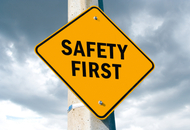Security Tips for Professionals Traveling this Holiday Season
Business travelers have a need to stay connected on the road, but it’s important to keep your data safe while traveling. With Thanksgiving and the holiday travel season about to kick off, we suggest some of the following tips to keep in mind.

1. Be discreet and less obvious in public.
It is very easy for competitors or criminals to pick up your conversations at dinner, conferences or bars. Leave out sensitive information until in a secure location and avoid viewing sensitive information via laptop or PDA, which can make that information vulnerable to shoulder surfers.
If you must view private material in a public space, consider using a privacy filter over the laptop screen for extra security.
2. If you don’t have to have it with you, leave it at home or the office.
Do not carry sensitive information on a thumb drive or portable drive while on the road. If you are required to carry sensitive information with you, consider utilizing an encrypted thumb drive and storing the information securely.
3. Make sure your electronic devices are “travel ready”.
Once you’ve removed non-essential files and information from your laptop or PDA, make sure that it is as secure as possible. Disable all file-sharing, peer-to-peer communications, and vulnerable ports.
Laptops should be encrypted and protected with strong passwords. Remote connections should be set to automatically disconnect after a certain period of inactivity.
Keep in mind: the company security policy doesn’t change just because you are traveling, so don’t attempt to “work around” it by disabling the required security settings. Difficulties should be brought to the IT department’s attention for assistance.
4. Never leave your business belongings unattended.
Never leave your laptop, PDA or confidential company information in a hotel room or rental car. Ask the hotel for use of a safe if one is not already in the room.
More laptops and PDA’s are stolen from rental cars and hotel rooms than almost anywhere else.
5. Choose a safe and secure hotel.
To ensure that your belongings will be safe, review hotel ratings on-line and see what others have to say about the hotel as a whole.
6. Avoid using open or free Wi-Fi hotspots.
Avoid open networks, and look for a fully deployed Wi-Fi Protected Access (WPA) network, which affords a higher level of security. If you must connect to a hotel network, ensure that it is encrypted.
7. Using public computers is risky and should be avoided.
We have seen a number of public computers, like those found in a hotel’s business center that contained “keylogger” spyware, which records every keystroke including passwords and account information.
Key loggers make it possible for an identity thief to steal any information entered into the computer during your session. Never send or share confidential company information via a public computer.

8. Beware of pre texting calls or social engineering calls.
If you receive a call asking for personal or confidential information, do not provide it. Ask who they are, call them back and validate prior to sharing anything of a confidential nature.
The car company will not call you and ask for this after you have rented a car for example. This is a scam and once they obtain your information you are greatly exposed.
9. Make sure you fully understand your company’s travel policy.
Review your company’s policy and what you need to do as a representative of the company. Most companies provide a travel policy and share risk management information for your benefit. Ensure you know all of the necessary corporate phone numbers in the event you have an incident and report it immediately to the risk management or corporate security group.
10. Photo-copy all of the information in your wallet or purse.
Leave a copy of important documents at home with a family member. Be sure to include: driver’s license, credit cards and insurance cards (front and back). Should your wallet or purse be lost or stolen, you won’t be left wondering what was actually taken, and you’ll be able to quickly notify the appropriate agencies about what has taken place.
In addition, remember to leave contact information (i.e., email address or phone number) with family and colleagues so they can get in touch with you in the case of an emergency.
 Written by
Written by